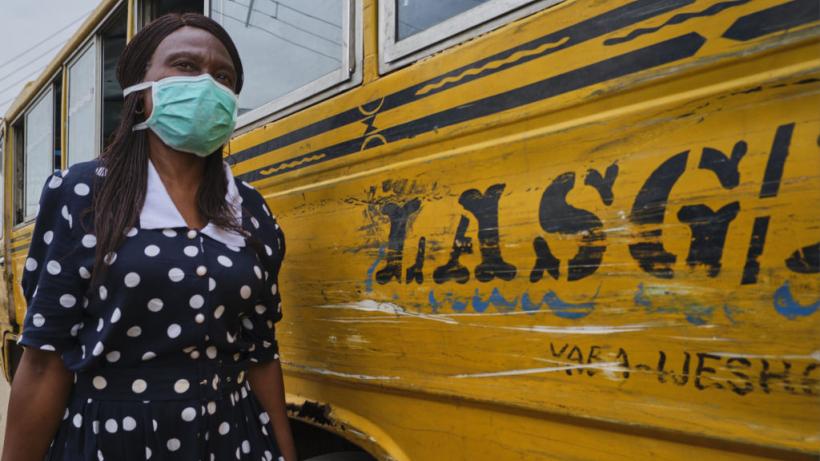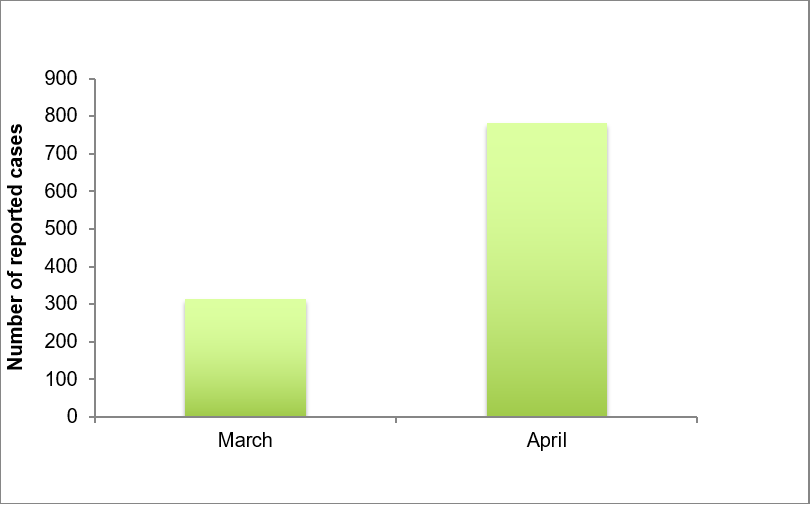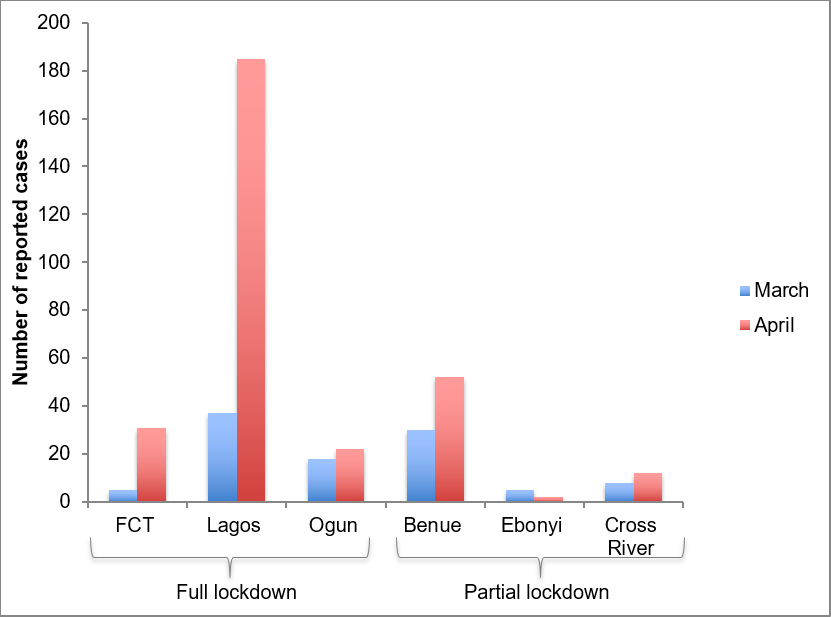
The shadow pandemic: Gender-based violence and COVID-19
Increases in gender-based violence during lockdowns, labelled the “shadow pandemic” by the UN, threaten the lives and livelihoods of women and girls in Africa’s largest economy.
Nigeria has long been facing a gender-based violence crisis, with 30% of women and girls aged 15-49 having experienced sexual abuse. Lack of coordination amongst key stakeholders and poor implementation of legal frameworks, combined with entrenched gender discriminatory norms, has hampered government and civil society efforts to address gender-based violence. These efforts have been further compromised by the COVID-19 pandemic.
The pandemic has seen the diversion of priorities and resources and resulted in a surge of reports of gender-based violence because of Federal Government imposed lockdowns in Lagos, the Federal Capital Territory (Abuja), and Ogun State. As Africa’s largest economy and most populous nation, Nigeria’s response to the gendered impacts of the COVID-19 pandemic will carry significant weight for the entire region.
Lockdowns can increase domestic violence
Whilst disease outbreaks threaten populations’ health, the aggressive response measures of governments, such as lockdowns, often increase women and girls’ vulnerability to violence. Indeed, since governments across the world began imposing lockdowns to fight the COVID-19 pandemic, countries have witnessed a rise in reports of gender-based violence. From the UK and US, to Singapore and China, authorities have reported increasing cases of domestic violence and demand for emergency shelter. There is rightfully major concern regarding the situation in many developing countries, where there is often an unfortunate widespread societal acceptance of gender-based violence.
The reports of domestic violence in Nigeria are following a similar trend to elsewhere in the world. Since various versions of lockdown were put in place across the country on 30 March, reported cases of gender-based violence have substantially risen. Figure 1 below shows the number of reported cases in March and April, respectively, for 23 out of 36 states in Nigeria in which data are available. This shows a monthly increase of 149% in reports of gender-based violence following the introduction of lockdowns at the end of March.
Figure 1: Reported cases of gender-based violence in Nigeria, March and April 2020

Moreover, breaking down the data by state lines, the effect of lockdowns becomes even more apparent. The Federal Government only decided to place Lagos state, Ogun state, and the Federal Capital Territory under full lockdowns. This was expanded to include Kano state, the most populous city in the North of the country, in mid-April. Local state governments elsewhere in the country tended to implement some lockdown restrictions, but these were not as strict as the ones imposed by the Federal Government.
Looking at the three states placed under full lockdown by the Federal Government, the increase in reports of domestic violence cases in April was even more profound, as highlighted in Figure 2. In these three states, the number of cases rose from 60 in March to 238 in April, an increase of 297%. By contrast, in Benue, Ebonyi, and Cross River states, which were placed under less stringent lockdowns by their respective local governments, the increase in cases was only 53% between March and April. In fact, in Ebonyi state, where the governor refused to place the state under total lockdown, the number of cases decreased from March to April.
Figure 2: Reported cases of gender-based violence in the Federal Capital Territory, Lagos, Ogun, Benue, Ebonyi, and Cross River states, March and April 2020

Compromised support services and access to justice
The lockdown has also compromised access to life-saving services and justice at a time when these are needed most. Many one-stop centres and domestic abuse shelters have been forced to close or provide limited services. Strict movement restrictions have meant that survivors are unable to access centres and shelters, having to rely on hotlines to receive any kind of support.
On top of this, as resources are diverted towards the pandemic response, access to justice and other forms of legal redress for survivors risk becoming increasingly difficult. Police officers in the Family and Support Units have been mobilised to support in enforcing the lockdown, leading to shrinking capacity to respond to calls of gender-based violence. Many court proceedings have been postponed, which will limit the system’s ability to issue protection and restraining orders that would otherwise have an immediate impact on protecting victims. There will also likely be a backlog of cases, hampering the quality of judiciary procedures in the future.
Destroyed livelihoods could push women into transactional sex
The sharp decline in oil prices and the disruption to economic activity because of the pandemic will have a catastrophic impact on the Nigerian economy. GDP growth is forecast to fall to between -3.4% and -8.8% for 2020. Research from the Ebola epidemic in West Africa shows that loss of livelihoods risks leading women to engage in negative coping mechanisms such as transactional sex. This heightens their exposure to further sexual exploitation and abuse, unwanted pregnancies, and contracting STDs. Nigerian women are particularly vulnerable in the COVID-19 pandemic, as over 80% of women in the labour force are employed in the informal sector with little or no social protection and safety nets.
School closures increase risk of child marriage
Moreover, prolonged school closures put young and adolescent girls at increased risk of child marriage and teenage pregnancy. In Nigeria, 18 million female learners have been affected by school closures. Early marriage is already widespread in Nigeria, with 44% of girls married before the age of 18. In a context where girls’ education is already undervalued, and families are forced to make sacrifices due to economic constraints such as prioritising boys’ education, the option of marrying girls off to wealthy men is likely to seem more appealing. The United Nations Population Fund predicts that an additional 13 million child marriages will take place globally in the next 10 years that would have otherwise been prevented due to the disruption caused by the COVID-19 pandemic. With the third highest absolute number of child brides in the world, Nigeria is at risk of bearing many of these additional child marriages.
Policy implications: Support services, education, and legislation
In the short-term, it is essential that the Nigerian government and its international development partners invest in the capacity of gender-based violence service providers to meet the increasing demand for support. This includes ensuring that staff can operate safely in line with WHO guidelines on social distancing. The government’s information dissemination and community education on COVID-19 should also incorporate messaging on raising awareness about gender-based violence, including providing information on where victims can seek help.
The justice sector must prioritise the prosecution of perpetrators of gender-based violence whilst police enforcing lockdowns should be equipped with appropriate training on response and referral of incidences of gender-based violence. Government cash transfer schemes cushioning the COVID-19 pandemic’s impact on livelihoods should target vulnerable women. Meanwhile, the government and its partners in the education sector can prioritise the safe and continued learning of girls through widening the reach of lessons broadcast via radio, television, and simple mobile phones.
In the more medium-term, the global spotlight on the rise of gender-based violence during the COVID-19 crisis provides an opportunity to strengthen legislation protecting women and girls from violence. Passed in 2015, the Violence Against Persons (Prohibition) Act, is a monumental instrument revolutionising the legal space as it relates to gender-based violence in Nigeria. However, it has only been domesticated in 10 out of the 36 states and the Federal Capital Territory (FCT). Civil society organisations, legislators, and development partners should scale-up advocacy for the immediate domestication of the Violence Against Persons Act nationwide.
Concluding remarks: Action against gender-based violence must be prioritised
This year marks the 25th Anniversary of the Beijing Declaration and Platform for Action, the most visionary agenda for advancing women’s rights everywhere, of which Nigeria is a signatory. The COVID-19 pandemic has overshadowed what should have been a year of reflection on the progress made and strategising on concrete actions to address urgent issues such as gender-based violence. More so, the effects of the COVID-19 pandemic threaten any progress that has been made in tackling gender-based violence. Nigeria must ensure that its recovery from the pandemic promotes a more gender inclusive society, where women and girls’ rights are protected and their opportunities promoted, so that the progress made in the last 25 years was not in vain.
Disclaimer: The views expressed in this post are those of the authors based on their experience and on prior research and do not necessarily reflect the views of the IGC.

